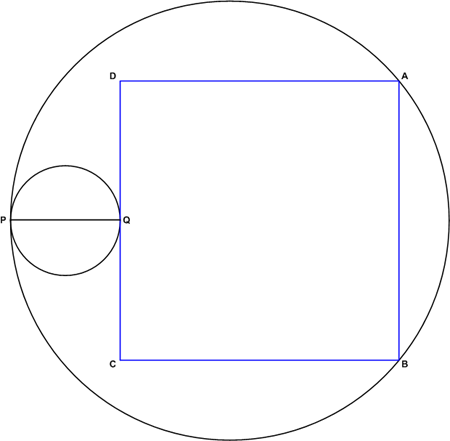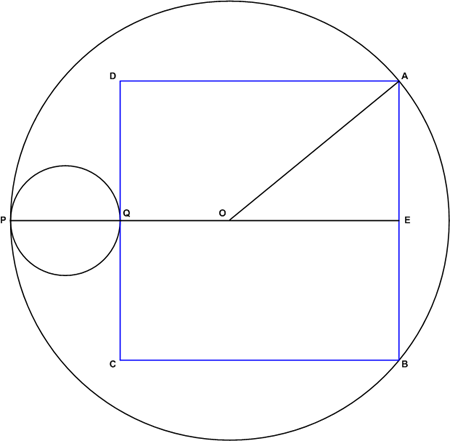Difference between revisions of "1994 AIME Problems/Problem 2"
Hyprox1413 (talk | contribs) m (→Solution: boxed solution) |
Pi is 3.14 (talk | contribs) (→Solution) |
||
| (2 intermediate revisions by the same user not shown) | |||
| Line 18: | Line 18: | ||
The [[quadratic formula]] shows that the answer is <math>\frac{16 \pm \sqrt{16^2 + 4 \cdot 240}}{2} = 8 \pm \sqrt{304}</math>. Discard the negative root, so our answer is <math>8 + 304 = \boxed{312}</math>. | The [[quadratic formula]] shows that the answer is <math>\frac{16 \pm \sqrt{16^2 + 4 \cdot 240}}{2} = 8 \pm \sqrt{304}</math>. Discard the negative root, so our answer is <math>8 + 304 = \boxed{312}</math>. | ||
| + | |||
| + | == Video Solution by OmegaLearn == | ||
| + | https://youtu.be/nPVDavMoG9M?t=32 | ||
| + | |||
| + | ~ pi_is_3.14 | ||
== See also == | == See also == | ||
Latest revision as of 02:53, 23 January 2023
Problem
A circle with diameter ![]() of length 10 is internally tangent at
of length 10 is internally tangent at ![]() to a circle of radius 20. Square
to a circle of radius 20. Square ![]() is constructed with
is constructed with ![]() and
and ![]() on the larger circle,
on the larger circle, ![]() tangent at
tangent at ![]() to the smaller circle, and the smaller circle outside
to the smaller circle, and the smaller circle outside ![]() . The length of
. The length of ![]() can be written in the form
can be written in the form ![]() , where
, where ![]() and
and ![]() are integers. Find
are integers. Find ![]() .
.
Note: The diagram was not given during the actual contest.
Solution
Call the center of the larger circle ![]() . Extend the diameter
. Extend the diameter ![]() to the other side of the square (at point
to the other side of the square (at point ![]() ), and draw
), and draw ![]() . We now have a right triangle, with hypotenuse of length
. We now have a right triangle, with hypotenuse of length ![]() . Since
. Since ![]() , we know that
, we know that ![]() . The other leg,
. The other leg, ![]() , is just
, is just ![]() .
.
Apply the Pythagorean Theorem:
The quadratic formula shows that the answer is ![]() . Discard the negative root, so our answer is
. Discard the negative root, so our answer is ![]() .
.
Video Solution by OmegaLearn
https://youtu.be/nPVDavMoG9M?t=32
~ pi_is_3.14
See also
| 1994 AIME (Problems • Answer Key • Resources) | ||
| Preceded by Problem 1 |
Followed by Problem 3 | |
| 1 • 2 • 3 • 4 • 5 • 6 • 7 • 8 • 9 • 10 • 11 • 12 • 13 • 14 • 15 | ||
| All AIME Problems and Solutions | ||
The problems on this page are copyrighted by the Mathematical Association of America's American Mathematics Competitions. 











